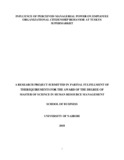| dc.contributor.author | Muinde, Edna M | |
| dc.date.accessioned | 2019-01-15T06:58:42Z | |
| dc.date.available | 2019-01-15T06:58:42Z | |
| dc.date.issued | 2018 | |
| dc.identifier.uri | http://hdl.handle.net/11295/104679 | |
| dc.description.abstract | This research sought to analyse the impact of perceived managerial power on organizational citizenship while using Tuskys supermarket as the case company. The objective of the study was to determine the influence of managerial power on employee citizenship behaviour at Tuskys supermarket. The study was anchord upon two theories: McClelland’s human motivation theory and social exchange theory. Descriptive survey design was utilized and 119 employees from 22 branches of Tuskys participated. Questionnaire in the form of five point likert scale was used to collect data. Data was analysed using SPSS due to the quantitative nature of the study. The findings show a positive relationship between perceived managerial power and OCB in Tuskys. The study further found that referent dimension of managerial power resulted into the highest level of OCB. It is recommended that Tuskys to continually train its managers on how they can effectively increase understanding of the needs of their junior employees in order to increase their citizenship. | en_US |
| dc.language.iso | en | en_US |
| dc.publisher | University of Nairobi | en_US |
| dc.rights | Attribution-NonCommercial-NoDerivs 3.0 United States | * |
| dc.rights.uri | http://creativecommons.org/licenses/by-nc-nd/3.0/us/ | * |
| dc.subject | Influence of Perceived Managerial Power on Employee Organizational Citizenship Behavior at Tuskys Supermarket | en_US |
| dc.title | Influence of Perceived Managerial Power on Employee Organizational Citizenship Behavior at Tuskys Supermarket | en_US |
| dc.type | Thesis | en_US |



